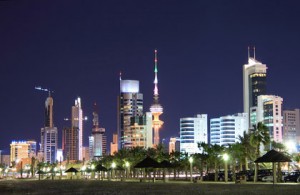By Oliver Cornock www.arabianbusiness.com
Kuwait was one of the first countries in the region to float the idea of a metropolitan rapid transit network, and attention is once again returning to public transport projects in the country.

While there has long been talk of developing a rapid transit system in Kuwait, the proposal has been taken further by the private Kuwait Overland Transport Union through a detailed feasibility study completed last year that included setting out routes and estimating the cost of the project.
The plan called for a four-line metro grid to be built, with some two-thirds of the network to be elevated and the remainder below ground. According to government projections, when the 165km network is fully operational, it will carry 69m passengers a year.
However, the scheme was soon sidetracked, even though there had been an announcement that tenders would be called for the project before the end of 2008. In January, the government said it would conduct a comprehensive study of Kuwait’s land transport needs, with the metro project to be incorporated into a wider national transport strategy.
Enthusiasm for the rail network may have got a timely boost from the opening of the initial stage of Dubai’s metro network on September 9, the much-touted answer to the emirate’s traffic congestion and pollution problems.
In its first two weeks of operations, more than 1m passengers rode the Dubai metro. Although it will be some time before a full assessment of the Dubai metro can be made,. the launch and apparent popularity of the line could encourage Kuwait to push ahead with its own project.
Supporters of the Kuwaiti scheme say the transit system will reduce pollution and traffic congestion in Kuwait City, encourage more decentralised residential development, and promote economic growth in outlying areas that will be opened up by quick rail access.
Though all this will likely be true, as is the case with most such major public transport schemes, there are almost as many cons as there are pros. In particular, the cost of constructing and operating the metro could weigh against the project.
While the development should ease Kuwait’s traffic congestion and could prove popular with commuters, it is unlikely to turn a profit. In its current form, the metro grid is expected to cost around $7bn. While this may change following the broad review of the country’s transport needs and the type of rail system needed – underground, raised or ground level – the outlay will be high.
Added to this is the fact that there is little chance this initial outlay will be recovered though earnings once the network is up and running. Even with the projected 69m passengers a year, in order to make a return on investments and then turn a profit, ticket prices will have to be high, defeating the objective of a low-cost transport system.
Most of the proposals put forward for the metro scheme involve a mix of public and private capital to fund the project. One version of the partnership arrangement put forward by the Ministry of Communications would see the state providing 24% of the project funding, contractors putting in 26% and the remaining 50% coming via an initial public offering (IPO).
Another suggested funding breakdown has the state contributing 50% of the capital required and the other half coming from the private sector, with several companies to be set up to undertake different parts of the projects, each being subject to an IPO.
Though these formulas would restrict the state’s exposure to the project and serve to encourage greater private participation in the economy, the question remains as to whether either the lead contractor or other investors would commit to a scheme that is a potential loss-maker.
However, at least some of the running costs of the metro could be offset by the lower use of subsidised petrol by commuters. With Kuwait having some of the cheapest fuel in the world, there is less inducement for locals to find an alternative to the automobile to get around. Raising the price of petrol at the pump could induce some motorists to abandon their cars and adopt the metro as their transport of choice, with the higher cost of fuel and more revenue from ticket sales combining to reduce any potential losses.
While the slow pace of the metro project may be frustrating for some, there could be advantages to adopting a methodical approach. By not being the first train out of the station, Kuwait’s planners will be able to learn from the experiences of Dubai and other cities, taking the best and avoiding the worst in the planning and construction process and also developing a sound funding model acceptable to all.
By all accounts, it is not a case of if but when for Kuwait’s urban rail transit network. The extended planning and development process may well result in a project that can combine versatility and popularity with profitability, a rare combination in public transport.
Oliver Cornock is Middle East specialist, Oxford Business Group’s Regional Editor in the GCC.


















